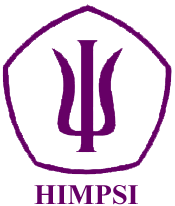The Effect of Social Media Use on Happiness in College Students in Malang City
Abstract
Full Text:
PDFReferences
Arampatzi, E., Burger, M. J., & Novik, N. (2018). Social Network Sites, Individual Social Capital and Happiness. Journal of Happiness Studies, 19(1), 99–122. https://doi.org/10.1007/s10902-016-9808-z
Azharuddin, N. R., & Qodariah, S. (2021). Hubungan Adiksi Media Sosial dengan Psychological Well-Being pada Mahasiswa di Kota Bandung. Prosiding Psikologi, 7(2), 168–172. https://doi.org/10.29313/.v0i0.28224
Bila, I., & Hoian, I. (2022). Happiness as a Psychological Formation. Technologies of Intellect Development, 6(1(31)). https://doi.org/10.31108/3.2022.6.1.8
Fauziah, S., Hacantya, B. B., Paramita, A. W., & Saliha, W. M. (2020). Kontribusi Penggunaan Media Sosial dalam Perbandingan Sosial pada Anak-Anak Akhir. PSYCHO IDEA, 18(2), 91–103. https://doi.org/10.30595/psychoidea.v18i2.7145
Griffin, P. W., & Sarnataro, N. (2023). Happiness and Subjective Well-Being. In H. S. Friedman & C. H. Markey (Eds.), Encyclopedia of Mental Health (3rd ed.). Oxford: Academic Press. https://doi.org/10.1016/B978-0-323-91497-0.00135-1
Gudka, M. (2022, December 13). How Social Media Can Add to Your Well-Being (not Detract from It). Greater Good. Retrieved from https://greatergood.berkeley.edu/article/item/how_social_media_can
_add_to_your_wellbeing_not_detract_from_it
Harimurti, A. (2022). Analisis Tematik Kebahagiaan pada Milenial Kelas Menengah. Suksma: Jurnal Psikologi Universitas Sanata Dharma, 3(2), 49–59. https://doi.org/10.24071/suksma.v3i2.4956
Hurlock, E. B. (1991). Psikologi Perkembangan: Suatu Pendekatan Sepanjang Rentang Kehidupan (R. M. Sijabat, Ed.; Istiwidayanti & Soedjarwo, Trans.). Jakarta: Erlangga.
Keles, B., McCrae, N., & Grealish, A. (2020). A Systematic Review: The Influence of Social Media on Depression, Anxiety and Psychological Distress in Adolescents. International Journal of Adolescence and Youth, 25(1), 79–93. https://doi.org/10.1080/02673843.2019.1590851
Larson, L. R., Szczytko, R., Bowers, E. P., Stephens, L. E., Stevenson, K. T., & Floyd, M. F. (2019). Outdoor Time, Screen Time, and Connection to Nature: Troubling Trends Among Rural Youth? Environment and Behavior, 51(8), 966–991. https://doi.org/10.1177/0013916518806686
Liang, C., & Sun, J. (2022). A Study of the Happiness of Chinese University Students and Its Influencing Factors—A Case Study of Beijing Universities. Sustainability, 14(23), 16057. https://doi.org/10.3390/su142316057
Lyubomirsky, S., & Lepper, H. S. (1999). A Measure of Subjective Happiness: Preliminary Reliability and Construct Validation. Social Indicators Research, 46(2), 137–155. https://doi.org/10.1023/A:1006824100041
Mulyono, F. (2021). Dampak Media Sosial bagi Remaja. Jurnal Simki Economic, 4(1), 57–65. http://dx.doi.org/10.29407/jse.v4i1.66
Purboningsih, E. R., Massar, K., Hinduan, Z. R., Agustiani, H., Ruiter, R. A. C., & Verduyn, P. (2023). Perception and Use of Social Media by Indonesian Adolescents and Parents: A Qualitative Study. Frontiers in Psychology, 13. https://doi.org/10.3389/fpsyg.2022.985112
Righi, A., & Masserini, L. (2023). Measuring Relational Factors Underlying Subjective Happiness. Current Psychology, 42(11), 9225–9236. https://doi.org/10.1007/s12144-021-02208-2
Simsek, A., Elciyar, K., & Kizilhan, T. (2019). A Comparative Study on Social Media Addiction of High School and University Students. Contemporary Educational Technology, 10(2), 106–119. https://doi.org/10.30935/cet.554452
Tuck, A. B., Long, K. A., & Thompson, R. J. (2023). Social Media’s Influence on Momentary Emotion Based on People’s Initial Mood: An Experimental Design. Cognition & Emotion, 37(5), 1049–1056. https://doi.org/10.1080/02699931.2023.2219443
Twenge, J. M., Spitzberg, B. H., & Campbell, W. K. (2019). Less in-Person Social Interaction with Peers Among U.S. Adolescents in the 21st Century and Links to Loneliness. Journal of Social and Personal Relationships, 36(6), 1892–1913. https://doi.org/10.1177/0265407519836170
Winata, C., & Andangsari, E. W. (2017). Dispositional Gratitude and Social Comparison Orientation Among Social Media Users. Humaniora, 8(3), 229–237. https://doi.org/10.21512/humaniora.v8i3.3620
Zhang, J., Marino, C., Canale, N., Charrier, L., Lazzeri, G., Nardone, P., & Vieno, A. (2022). The Effect of Problematic Social Media Use on Happiness Among Adolescents: The Mediating Role of Lifestyle Habits. International Journal of Environmental Research and Public Health, 19(5), 2576. https://doi.org/10.3390/ijerph19052576
DOI: http://dx.doi.org/10.17977/um023v13i22024p273-279
Refbacks
- There are currently no refbacks.
Copyright (c) 2024 Jurnal Sains Psikologi

This work is licensed under a Creative Commons Attribution 4.0 International License.
Reference Manager :
|
Aliansi:
Plagiarism Checker :
This work is licensed under a Creative Commons Attribution 4.0 International License.



1.png)








